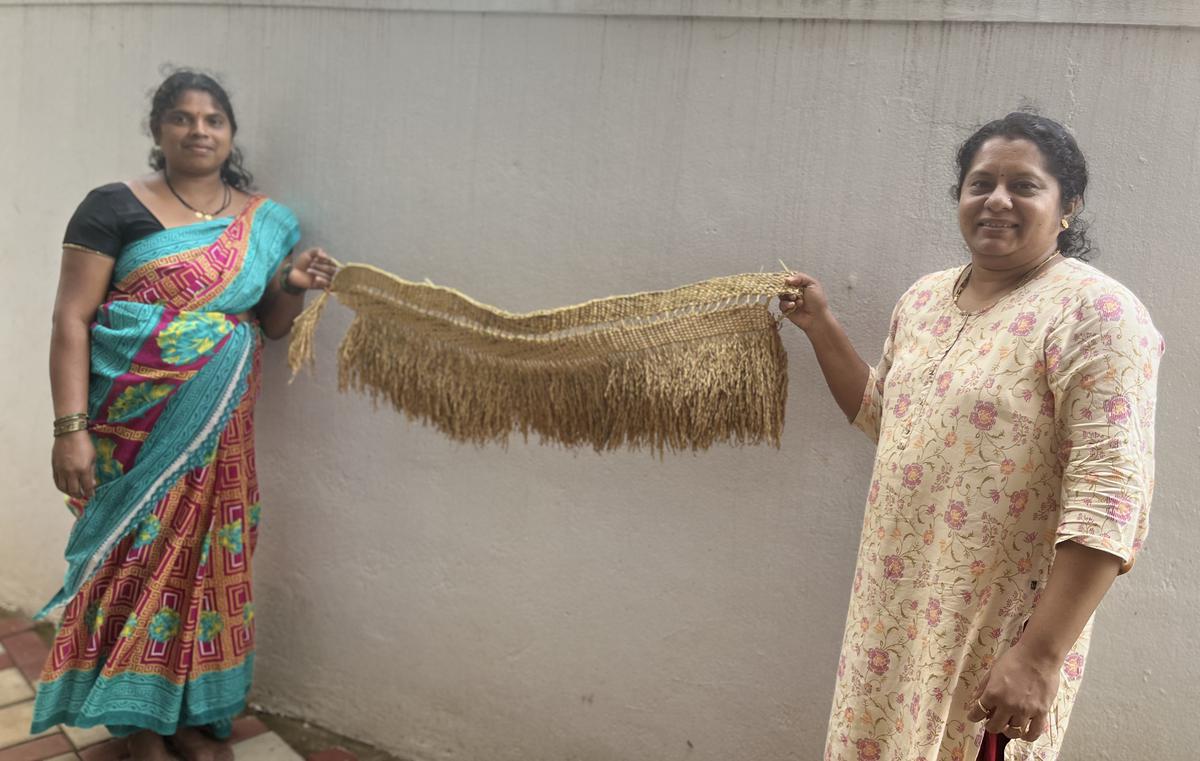[ad_1]
The artisans employ paddy varieties namely Jaya and Savirdaone Batta to weave the thorans
| Photo Credit: Special arrangement
Amidst the sound of birds and everyday village life, one can hear Savitri Gauda sing in Kannada about what a beautiful day it is. “Singing give me energy,” says the 48-year-old, who is from the Halakki Gowdas community, in Kumta village of Karnataka. She, along with 19 others, has been plaiting rice sheaves into thorans for the past five years. The women have sold nearly 100,000 thorans till date, with the help of their zilla panchayat member Veena Suraj Naik Soni.
Veena helps the women market their products through Facebook.

Zilla panchayat member Veena Suraj Naik Soni helps the women market their products on Facebook
| Photo Credit:
Special arrangement
It all started in 2019, when Veena gathered women from the village to take stock of the situation after a flood hit their region. “During these interactions, I noticed the thorans and mats they made at home and was drawn to them,” explains Veena, who was then a Computer Science teacher at a college in Kumta. She eventually quit her job to work on community development initiatives in the village.
“I decided to assist in promoting their products so that they could make a livelihood out of it,” explains Veena, whose intervention had resulted in the women making nearly 50 thorans a day.
Weaving thorans is a skill that has been passed down generations. The women work from home once their chores of the day are done, and sometimes gather at a common place in the village to sing and weave together. They employ paddy varieties namely Jaya and Savirdaone Batta to weave these works of art. “The thorans measure two feet in length and can go up to 20 feet, based on customer requirement,” explains Veena, adding: “The bigger ones are used at weddings and outdoor events.” The women also weave mats with East Indian Grass, commonly known as vetiver, but it is a seasonal product and is not available through the year.
The Halakki women are hard working; they travel across forests and farmlands to make a living. To them, thorans are a sign of prosperity, which is why they sing as they go about weaving them. “They work in the fields only during sowing season or harvest, and work as household help or as daily wagers during other parts of the year,” Veena points out.
The practice of weaving rice sheaves is not just confined to the Halakki Gowda community. Several agricultural communities across India do so to decorate their homes to ring in good health, wealth and prosperity. It also has another purpose: to feed birds. The thorans, placed at the main door, attract birds that come looking for grains once the harvest season is over,
Veena is all set to train more women in this craft. “Each thoran lasts up to four years,” she points out. “Do remember that a few grains may fall in transit. An eco-friendly thoran, made from rice sheaves, feeds many birds, squirrels and insects”.
Priced at ₹100 for one feet. For details, email veenascreation@gmail.com.
[ad_2]
Source link


